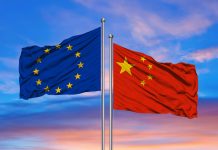DM Monitoring
BRUSSELS: Far more people around the world think China has responded well to the COVID-19 pandemic than those who think the United States has done a good job, a poll by the Alliance of Democracies Foundation showed on Monday.
The survey of more than 120,000 people from 53 countries by the think tank and German polling data firm Dalia Research found that even in democratic countries, 45% of people thought their governments had limited too many freedoms during the pandemic.
“COVID-19 is also a litmus test for democracy,” said Anders Fogh Rasmussen, chairman of the Alliance of Democracies Foundation and a former NATO secretary general. “It should act as a wake up call to democratic leaders that people want more democracy and freedom after COVID-19,” he said.
More than 60% of people surveyed thought China had responded well to the pandemic, while only a third around the world thought the U.S. response had been effective. Just over half of those surveyed in the United States thought their government had responded well, however. The survey found that most Chinese think the United States has a negative influence on democracy globally.
Greece, Taiwan, Ireland, South Korea, Australia and Denmark were the countries where the largest proportions of people said their governments had responsed well to the crisis. People in Brazil, France, the United States, Italy and the UK felt their governments handled the situation badly.
Separately, the study showed that a majority of the world thinks it is likely or somewhat likely that a foreign power will influence the results of their next election. The two countries that worried the least about foreign interference were China and Russia. Ahead of the U.S. presidential election in November, 55% percent of Americans think that interference is very or somewhat likely.
Agencies add: Beijing reported its second consecutive day of record new numbers of Covid-19 cases on Monday, adding urgency to efforts to rein in a sudden resurgence of the coronavirus in the Chinese capital.
The recent outbreak has been traced to Xinfadi, a sprawling wholesale food market that is the biggest in Asia and accounts for 80 per cent of Beijing’s farm produce supply sourced both domestically and from overseas.
The market has been shut, tens of thousands of nearby residents are being tested for the virus, and a city-wide campaign launched to identify people who have recently visited the market or been in contact with people who have. Some schools have started to suspend classes.
“The risk of the epidemic spreading is very high, so we should take resolute and decisive measures,” Xu Hejiang, spokesman at the Beijing city government, said at a press conference on Monday.
Xinfadi, a complex of warehouses and trading halls spanning an area the size of nearly 160 soccer pitches, is more than 20 times larger than the seafood market in Wuhan where the coronavirus originated. Thousands of tonnes of vegetables, fruits and meats are traded at Xinfadi each day.
Beijing officials on Monday confirmed 36 new Covid-19 cases for June 14, the same as a day earlier, which was the city’s highest daily infection count since late March. Officials have now reported 79 cases over just four days, the biggest concentration of infections since February.
A number of neighbourhoods in the west and southwest of Beijing have been upgraded to medium-risk, including Financial Street where banks and financial firms converge, which calls for measures such as strict control of people and vehicle movements, disinfections and temperature checks. One neighbourhood in the same district as the food market was raised to high-risk, denoting the most severe level of infection and warning people not to go there.
Beijing started testing en masse on Sunday, conducting 76,499 tests. Fifty-nine individuals tested positive, Gao Xiaojun, a spokesperson for the Beijing public health commission, said at Monday’s briefing.
Samples of 8,950 people who were recently at Xinfadi had been collected as of early Monday, said Gao, adding that results from the 6,075 tested so far were negative.
Investigation
The new Beijing cluster prompted governments in some cities and provinces to warn their residents against non-essential travel to the capital, and to implement isolation protocols and testing for some incoming visitors from the capital.
The northeastern province of Liaoning and northern Hebei province have reported a combined handful of cases connected to the Beijing infections. Sichuan in the southwest reported one suspected case on Monday.
The World Health Organisation said on Sunday it was informed of the outbreak by Chinese officials who were investigating its source and extent. WHO reinforced the need for thorough investigations.
“Genetic sequencing from humans and environmental samples is ongoing, and WHO encourages the release of these sequences as soon as possible,” WHO said in its statement. “WHO understands that genetic sequences will be released as soon as possible once further laboratory analyses are completed.”
An epidemiologist with the Beijing government said on Sunday that a DNA sequencing of the virus showed the Xinfadi outbreak could have come from Europe.
“Our preliminary assessment is the virus came from overseas. We still can’t determine how it got here. It might’ve been on contaminated seafood or meat, or spread from the faeces of people inside the market,” state media quoted Yang Peng as saying.




